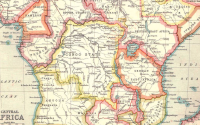Common Dreams / Published on Sunday, December 19, 2004 by the lndependent/UK
Governments from around the world yesterday narrowly succeeded in keeping the international bid to combat catastrophic global warming alive, in the face of determined attempts by the re-elected Bush administration to kill it off.
Top negotiators described the effort - at a special UN conference in Buenos Aires - as like hanging on to a cliff face by their "fingernails", as the United States and oil-producing countries threw rock after rock to try to dislodge them.
More than 36 hours after the conference was supposed to have ended - following two all-night negotiating sessions, and while workmen were physically dismantling the facilities around them - delegates finally agreed on a series of compromises that avoided complete breakdown and kept some life in the negotiations.
The US said that "on balance" it was "very pleased with the outcome", but its obdurate obstruction of even anodyne proposals at the two-week conference bodes ill for the future of the talks, which are designed to hammer out the next tough steps to be taken after the Kyoto Protocol runs its course in 2012.
It will also sharply increase the pressure on Tony Blair, who has committed himself to making progress on combating global warming - and involving the US in the effort - one of the key priorities for his leadership of the G8 group of the world's most powerful countries next year. Even before the cliff-hanger conference, Downing Street was increasingly at a loss about how it was going to fulfil the worldwide expectations raised by the Prime Minister in two high-profile speeches this year on what he describes as "long term, the single most important issue facing the global community".
The US performance in Buenos Aires appears to fly in the face of a commitment given by President Bush in 2001, when he announced that the US would withdraw from the protocol that it had previously played a key part in negotiating. In the face of international outrage, he said then that even though it was pulling out, the US would do nothing to obstruct other countries trying to reach agreement. By and large it has kept to this position since, at least in public, believing that the protocol was doomed without its participation.
But this autumn Washington was shocked and angered when Russia agreed to ratify the protocol - completing the number of countries needed, under its complex rules, to bring it into force. Environmentalists say that the re-elected Bush administration has decided to do everything it can to sabotage any further international measures, and is not concerned about the international condemnation it will incur in the process.
This transformed the Buenos Aires conference, which was expected to be a routine and relatively uncontroversial meeting, the last before negotiations on the follow-up to Kyoto begin in earnest next November. Its chairman, Raul Estrada-Oyuela, an Argentinian diplomat who played a central role in the negotiation of the protocol seven years ago, proposed an apparently inoffensive series of informal meetings over next year to prepare the ground for the talks.
But this was vigorously opposed by the US, which insisted there could only be one informal meeting, and that no ideas for the future could be discussed at it. The Americans also objected to mentions of the need to tackle global warming as opposed to adapting to it, and backed an extraordinary demand from Saudi Arabia that oil-producing states should receive billions of dollars in compensation from the rest of the world if they burned less oil.
Eventually a single meeting that could discuss the future was agreed for next May, and other uneasy compromises were reached, preventing total breakdown. "It is a finger-hold, like hanging on by your nails," says Michael Zammit Cutajar, a veteran climate negotiator for Malta who was for 11 years executive secretary of the UN Framework Convention on Climate Change.






